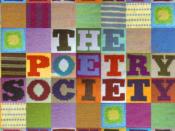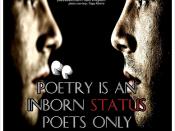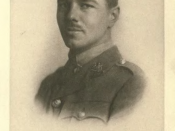This poem, by Wilfred Owen, was a form of moral propaganda. Wilfred Owen's purpose in writing it was to convince the deluded British public that they had been lied to. He knew from first hand experience the terror, pain, horror and inhumanity of war; this made him feel disgusted and enraged at how different war was to the impression that men signing up to fight were given. He hated what men were put through in the name of 'justice', and his anger and contempt for those who upheld this notion of 'It is sweet and fitting to die for your country' is superbly voiced in this moving poem.
He enforces his argument using different viewpoints which appeal to different human emotions. He uses horror, panic, empathy and guilt to make the reader believe what he is saying. The poem tells of men coming back from the front lines, 'drunk with fatigue'.
As they 'cursed through sludge', there is a gas attack. One man does not get his gas mask on in time, and dies a horrible death. At the end of the poem, Owen says that if 'my friend' had been there and seen the man dying upon the wagon, then they would not be so happy to say 'the old lie, dulce et decorum est pro patria mori.'
The first stanza introduces the weary soldiers, starting with 'bent double, like old beggars under sacks'. This is not at all how most people would think of soldiers; Instead of proud and tall, marching back from victory, they are compared to old beggars, bent over double. It goes on to say 'coughing like hags, we cursed through sludge'. This, once again, is in total contrast to the expected portrayal of a soldier. 'Coughing like hags' makes them sound old...


